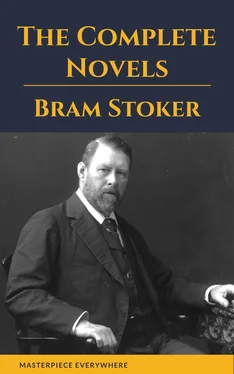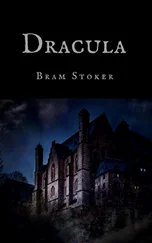Bram Stoker - Bram Stoker - The Complete Novels
Здесь есть возможность читать онлайн «Bram Stoker - Bram Stoker - The Complete Novels» — ознакомительный отрывок электронной книги совершенно бесплатно, а после прочтения отрывка купить полную версию. В некоторых случаях можно слушать аудио, скачать через торрент в формате fb2 и присутствует краткое содержание. Жанр: unrecognised, на английском языке. Описание произведения, (предисловие) а так же отзывы посетителей доступны на портале библиотеки ЛибКат.
- Название:Bram Stoker: The Complete Novels
- Автор:
- Жанр:
- Год:неизвестен
- ISBN:нет данных
- Рейтинг книги:3 / 5. Голосов: 1
-
Избранное:Добавить в избранное
- Отзывы:
-
Ваша оценка:
- 60
- 1
- 2
- 3
- 4
- 5
Bram Stoker: The Complete Novels: краткое содержание, описание и аннотация
Предлагаем к чтению аннотацию, описание, краткое содержание или предисловие (зависит от того, что написал сам автор книги «Bram Stoker: The Complete Novels»). Если вы не нашли необходимую информацию о книге — напишите в комментариях, мы постараемся отыскать её.
The Complete Novels :
The Primrose Path
The Snake's Pass
The Watter's Mou'
The Shoulder of Shasta
Dracula
Miss Betty
The Mystery of the Sea
The Jewel of Seven Stars
The Man
Lady Athlyne
The Lady of the Shroud
The Lair of the White Worm
Bram Stoker: The Complete Novels — читать онлайн ознакомительный отрывок
Ниже представлен текст книги, разбитый по страницам. Система сохранения места последней прочитанной страницы, позволяет с удобством читать онлайн бесплатно книгу «Bram Stoker: The Complete Novels», без необходимости каждый раз заново искать на чём Вы остановились. Поставьте закладку, и сможете в любой момент перейти на страницу, на которой закончили чтение.
Интервал:
Закладка:
“How does Joyce take his defeat?”
“Badly, poor fellow, I am told; indeed, from what I see of him, I am sure of it. They tell me that up to lately he was a bright, happy fellow, but now he is a stern, hard-faced, scowling man — essentially a man with a grievance, which makes him take a jaundiced view of everything else. The only one who is not afraid to speak to him is his daughter, and they are inseparable. It certainly is cruelly hard on him. His farm is almost an ideal one for this part of the world; it has good soil, water, shelter, trees, everything that makes a farm pretty and comfortable, as well as being good for farming purposes; and he has to change it for a piece of land as irregular in shape as the other is compact; without shelter, and partly taken up with this very bog and the utter waste and chaos which, when it shifted in former times, it left behind.”
“And how does the other, Murdock, act?”
“Shamefully; I feel so angry with him at times that I could strike him. There is not a thing he can say or do, or leave unsaid or undone, that is not aggravating and insulting to his neighbor. Only that he had the precaution to bind me to an agreement for a given time, I’m blessed if I would work for him, or with him at all — interesting as the work is in itself, and valuable as is the opportunity it gives me of studying that strange phenomenon, the Shifting Bog.”
“What is your work with him,” I asked — “mining, or draining, or what?”
He seemed embarrassed at my question. He “‘hum’d and ‘ha’d” — then with a smile he said quite frankly: “The fact is that I am not at liberty to say. The worthy Gombeen Man put a special clause in our agreement that I was not, during the time of my engagement, to mention to any one the object of my work. He wanted the clause to run that I was never to mention it; but I kicked at that, and only signed in the modified form.” I thought to myself, “More mysteries at Shleenanaher!”
Dick went on:
“However, I have no doubt that you will very soon gather the object for yourself. You are yourself something of a scientist, if I remember?” “Not me,” I answered, “my great aunt took care of that when she sent me to our old tutor — or, indeed, to do the old boyjustice, he tried to teach me something of the kind; but I found out it wasn’t my vogue — anyhow, I haven’t done anything lately.”
“How do you mean?” “I haven’t got over being idle yet. It’s not a year since I came into my fortune. Perhaps — indeed I hope — that I may settle down to work again.”
“I’m sure I hope so, too, old fellow,” he answered gravely. “When a man has once tasted the pleasure of real work, especially work that taxes the mind and the imagination, the world seems only a poor place without it.”
“Like the wurrld widout girruls for me, or widout bog for his ‘an’r!” said Andy, grinning as he turned round on his seat.
Dick Sutherland, I was glad to see, did not suspect the joke. He took Andy’s remark quite seriously, and said to me:
“My dear fellow, it is delightful to find you so interested in my own topic.”
I could not allow him to think me a savant. In the first place, he would very soon find me out, and would then suspect my motives ever after. And, again, I had to accept Andy’s statement, or let it appear that I had some other reason or motive — or what would seem even more suspicious still, none at all; so I answered:
“My dear Dick, my zeal regarding bog is new; it is at present in its incipient stage, in so far as erudition is concerned. The fact is, that although I would like to learn a lot about it, I am at the present moment profoundly ignorant on the subject.”
“Like the rest of mankind,” said Dick. “You will hardly believe that, although the subject is one of vital interest to thousands of persons in our own country — one in which national prosperity is mixed up to a large extent — one which touches deeply the happiness and material prosperity of a large section of Irish people, and so helps to mould their political action, there are hardly any works on the subject in existence.”
“Surely you are mistaken,” I answered.
“No, unfortunately, l am not. There is a Danish book, but it is geographically local; and some information can be derived from the blue-book containing the report of the International Commission on turf-cuttinq, but the special authorities are scant indeed. Some day, when you want occupation, just you try to find in any library, in any city of the world, any works of a scientific character devoted to the subject. Nay; more; try to find a fair share of chapters in scientific books devoted to it. You can imagine how devoid of knowledge we are, when I tell you that even the last edition of the Encyclopaedia Britannica does not contain the heading ‘bog.’”
“You amaze me!” was all I could say.
Then, as we bumped and jolted over the rough by-road, Dick Sutherland gave me a rapid but masterly survey of the condition of knowledge on the subject of bogs, with special application to Irish bogs, beginning with such records as those of Giraldus Cambrensis, of Dr. Boate, of Edmund Spenser, from the time of the first invasion, when the state of the land was such that, as is recorded, when a spade was driven into the ground a pool of water gathered forthwith. He told me of the extent and nature of the bog-lands, of the means taken to reclaim them, and of his hopes of some heroic measures being ultimately taken by Government to reclaim the vast Bog of Allen, which remains as a great evidence of official ineptitude.
“It will be something,” he said, “to redeem the character for indifference to such matters so long established, as when Mr. King wrote two hundred years ago, ‘We live in an island almost infamous for bogs, and yet I do not remember that anyone has attempted much concerning them.’”
We were close to Knockcalltecrore when he finished his impromptu lecture thus:
“In fine, we cure bog by both a surgical and a medical process. We drain it so that its mechanical action as a sponge may be stopped, and we put in lime to kill the vital principle of its growth. Without the other, neither process is sufficient; but together, scientific and executive man asserts his dominance.”
“Hear! hear!” said Andy. “Musha, but Docther Wilde himself (rest his sowl!) couldn’t have put itaisierto grip. It’s a purfessionalerthe young gintleman is, intirely!”
We shortly arrived at the south side of the western slope of the Hill, and, as Andy took care to inform me, at the end of the boreen leading to the two farms, and close to the head of the Snake’s Pass.
Accordingly, I let Sutherland start on his way to Murdock’s, while I myself strolled away to the left, where Andy had pointed out to me, rising over the slope of the intervening spur of the Hill, the top of one of the rocks which formed the Snake’s Pass. After a few minutes of climbing up a steep slope, and down a steeper one, I arrived at the place itself.
From the first moment that my eyes lit on it, it seemed to me to be a very remarkable spot, and quite worthy of being taken as the scene of strange stories, for it certainly had something “uncanny” about it.
I stood in a deep valley, or rather bowl, with behind me a remarkably steep slope of greensward, while on either hand the sides of the hollow rose steeply — that on the left, down which I had climbed, being by far the steeper and rockier of the two. In front was the Pass itself.
It was a gorge or cleft through a great wall of rock, which rose on the sea-side of the promontory formed by the Hill. This natural wall, except at the actual Pass itself, rose some fifty or sixty feet over the summit of the slope on either side of the little valley; but right and left of the Pass rose two great masses of rock, like the pillars of a giant gate-way. Between these lay the narrow gorge, with its walls of rock rising sheer some two hundred feet. It was about three hundred feet long, and widened slightly outward, being shaped something funnel-wise, and on the inner side was about a hundred feet wide. The floor did not go so far as the flanking rocks, but, at about two-thirds of its length, there was a perpendicular descent, like a groove cut in the rock, running sheer down to the sea, some three hundred feet below, and as far under it as we could see. From the northern of the flanking rocks which formed the Pass the rocky wall ran northward, completely sheltering the lower lands from the west, and running into a towering rock that rose on the extreme north, and which stood up in jagged peaks something like The Needles off the coast of the Isle of Wight.
Читать дальшеИнтервал:
Закладка:
Похожие книги на «Bram Stoker: The Complete Novels»
Представляем Вашему вниманию похожие книги на «Bram Stoker: The Complete Novels» списком для выбора. Мы отобрали схожую по названию и смыслу литературу в надежде предоставить читателям больше вариантов отыскать новые, интересные, ещё непрочитанные произведения.
Обсуждение, отзывы о книге «Bram Stoker: The Complete Novels» и просто собственные мнения читателей. Оставьте ваши комментарии, напишите, что Вы думаете о произведении, его смысле или главных героях. Укажите что конкретно понравилось, а что нет, и почему Вы так считаете.












